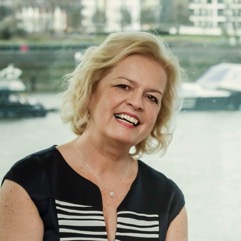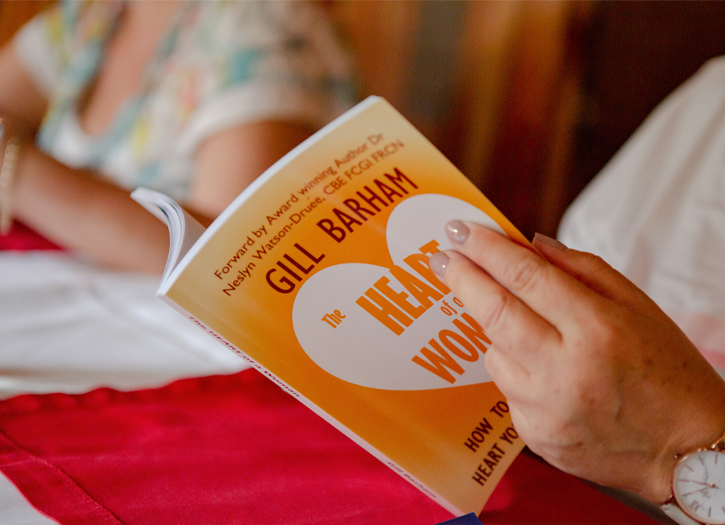Dr. Gill Barham is an international award-winning author, speaker, speaker trainer, menopause coach, and host of the Radiant Menopause podcast. Gill (pronounced ‘Jill’) studied music before qualifying as a Registered General Nurse in the United Kingdom. Her transformational work has been recognized with a Doctorate Honoris Causa from the Academy of Universal Global Peace. She’s also a member of the Association of Transformational Leaders Europe and proudly runs SPOT THE SIGNS, a domestic abuse awareness campaign. With her long list of honors and her knowledge about the often-taboo subject of menopause, we sat down with Gill for a Sheen Magazine exclusive to learn more about her work and her approach to healing.

Can you talk more about menopause and your work as a menopause coach?
It seems that, even today, talking about ‘the change of life’ is taboo. Because of this, most of us either:
- Never prepare for it.
- Don’t talk about it nearly enough.
- Think of it as ‘the end’ instead of celebrating it as the transition into midlife—our wisdom years.
- Assume that once we’ve been through it, we don’t need to do anything else; or,
- Are fearful of the scare stories around HRT or confused about therapies and natural alternatives.
Let’s look at some simple facts about menopause. We’ll start with terminology.
Perimenopause is the period of years that lead up to the last day of your period.
Menopause is the last day of your period, which is technically one year after your last bleed.
Post-menopause is everything after that.
If you’re like me, you may have experienced a surgical menopause due to:
- An operation like a hysterectomy with or without the preservation of the ovaries and cervix, or a mastectomy; or,
- As the result of cancer treatment.
In these cases, you’re thrown into perimenopause much faster and will never know the normal age at which you would’ve stopped menstruating.
When does menopause occur?
The average age for menopause in the western world is 51, which means that most women in their 40s experience perimenopausal symptoms. However, there are a few statistics to think about:
- 1 in 100 women experience menopause in their 40s; perimenopause occurs in their 30s.
- 1 in 1000 women experience menopause in their 30s; perimenopause occurs in their 20s.
- The perimenopause period can last between 7 to 14 years.
How can you tell if you’re in menopause?
Lab tests are useful for women under the age of 45. The blood test looks for raised Follicle Stimulating Hormone (FSH) levels. This hormone rises as the body attempts to make up for the decline in oestrogen levels. The test is not effective in later stages of menopause. Because of this, most women are ‘diagnosed’ as menopausal based on the range of symptoms experienced.
What are the symptoms of menopause?
Symptoms vary from woman to woman. Some women don’t have any symptoms during perimenopause while others, like me, experience an entire range. You’ll find 45 symptoms ranging from the most common to the most obscure listed on the symptom checker on my website.
What if I am post-menopausal?
Be reassured that even if you don’t have any of the symptoms listed, you’ll go through perimenopause and become post-menopausal after you stop menstruating. Although you may be one of the lucky ladies who sail through the transition, the fact that our lifespans are longer means that we’ll experience complications and are at higher risk for common post-menopausal illnesses like osteoporosis, Alzheimer’s, heart disease, diabetes, and cancer.
We can live without the beneficial effects of oestrogen for as long as 50 years. Just look at British war heroine Dame Vera Lynn who died at 103.
How can I help myself during menopause?
Developing more awareness is crucial so that you feel more empowered to take control and decide what’s right for you to live a fulfilled and happy midlife.
Here’s what you can do:
- Know the facts and myths about nutritional support, natural supplements, HRT, holistic therapies, suitable exercise, and the importance of self-care. This will help you ride the wave of hormonal changes.
- Talk to loved ones and friends about how you feel and how they can support you.
- Take stock of all areas of your life and be honest about what works and what doesn’t. This is a step I encourage my clients to take when we begin working together.
- Learn how to love and accept yourself unconditionally. This is a difficult but rewarding journey.
Let’s shift gears and talk about the characteristics that you bring to your profession.
Many professionals in the holistic health field have had personal health issues themselves and have found nonconventional therapies that have given them more control and power over their wellbeing. I often meet former nurses with the passion and compassion to help others, but they’ve found the allopathic, conventional medical approach limited. Like me, they see that we should stop treating symptoms and, instead, build health. Our bodies are amazing and if we can get out of the way and give our bodies the opportunity to naturally heal, we can achieve amazing results. This is a mind-body-soul approach based on the need for good, quality nutrition.
What advice would you give someone who wants to mirror your success?
Find a mentor, coach, company, or course that resonates with you. Do your due diligence and keep up to date with research. Decide the area you’re most interested in and specialize in that. Understand that we’re not here to fix but to guide and lead individuals who are ready to take the path to wellness.
What sense of purpose do you draw from your culture and community?
The people I admire most are “frequency keepers” and operate from a vibration of faith. I’ve learned that if I can be the sun where people can only see shadows, this can create the desire for change and the hope that it’s possible. I know this because I’ve benefited in this way from my own teachers.
Leave us with an inspiring message.
The natural, feminine energy of the wise, midlife woman is the most powerful tool we have to create a better future that’s aligned with loving and compassionate thoughts and actions. We can all lead our earth family into the light of a new reality and heart space. You are loving; you are lovable; you are loved; you are love.
How can we reach you or learn more about your work?
Websites: www.radiantmenopause.com and www.drgillbarham.com
Social Media: Twitter, Facebook, LinkedIn, Instagram, YouTube, Podcast







Add Comment
You must be logged in to post a comment.